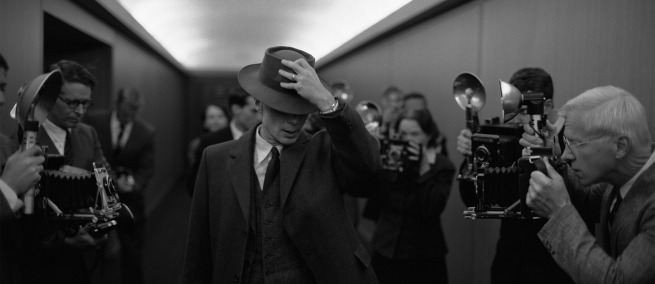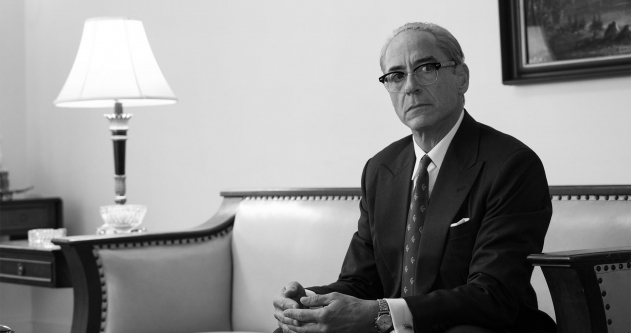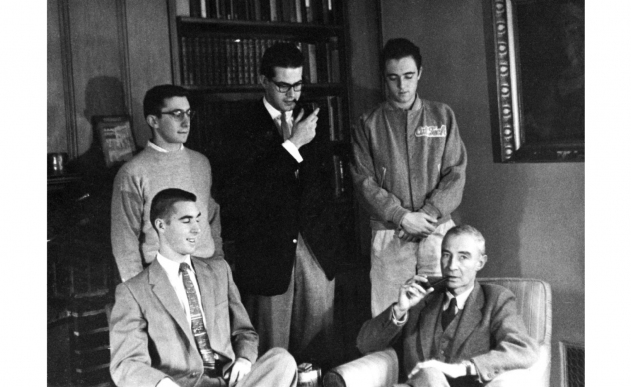
The first thing to say about OPPENHEIMER is that it is a very good movie. That fact was reinforced by my pre-feature experience at the theater, where I was subjected to a dozen or so deafening trailers for future attractions, seemingly designed to elicit epileptic fits. Ugh.
With OPPENHEIMER we enter a different world. It is a heightened reality, wherein some of the most remarkable events and personalities of modern times get brought to life, concentrated in time and sharing space in ways that only movies can bring about.
We get vivid views of the stark yet gorgeous desert landscapes around Los Alamos, and see the emergence of the makeshift small town/army base where young scientists, together with their families and supporting staff designed, and (nearby) assembled and tested, the first nuclear weapon. We also get immersive views of the very different academic environments they were plucked out of, notably Oppenheimer’s Berkeley. The cinematography is stunning throughout. As is the acting. In the lead role, Cillian Murphy as Oppenheimer is a haunted, haunting presence. His physical resemblance to the historical Oppenheimer, including his gaunt frame, famously blue eyes, and penetrating stare, is remarkable.
Matt Damon plays Leslie Groves, an army officer and engineer whose role in the success of the Manhattan Project is hard to overestimate. Groves oversaw not only the construction of Los Alamos, but also the critical, massive isotope separation and production reactor facilities in Oak Ridge Tennessee and Hanford Washington. Damon as Groves conveys an earthy integrity that wonderfully complements Oppenheimer’s weirdly naïve otherworldliness onscreen, as it did in life.

Still from OPPENHEIMER
Robert J. Downey Jr. plays Lewis Strauss, portrayed as the “heavy” in the pathetic story of Oppenheimer’s postwar public humiliation. In reality, Strauss was a wealthy conservative businessman and public servant who had serious security concerns. He also had personal animus toward Oppenheimer, whom he successfully persecuted in painfully unfair security hearings. It’s hard to imagine two roles more different than Strauss and Ironman but Downey, chameleon-like, is brilliant.
While those three characters have the most screen time, the cast is excellent from top to bottom. Physicists and historians of science will be especially interested to see the historically grounded portrayals of major figures including Lawrence, Rabi, Bethe, and Teller, who embody a wide spectrum of human personalities.
OPPENHEIMER is unusually long – three hours – but it is thoughtfully structured and framed, so it maintains high interest throughout. This is not the place for a synopsis, but I’d like to share a few key observations.
[spoilers start here]
The film begins with a strange mystery. In 1947 Strauss, as a trustee of Princeton’s Institute for Advanced Study, offered Oppenheimer its directorship, which he ultimately accepted. As part of the courtship, Strauss chaperoned Oppenheimer to the Institute’s greatest professor, Albert Einstein, and left them chatting by the Institute’s famous pond. We see Strauss returning as their conversation ends, and Einstein rather rudely walking right past him, without acknowledgement. Why? Was it something Oppenheimer said?

J. Robert Oppenheimer with students. Source: Caltech Archives
With that vignette pocketed, the film gets back to showing Oppenheimer’s steady rise to academic prominence (after a weird would-be poisoning incident that almost derailed it) and his parallel involvement in left-leaning political causes, all prior to the atom bomb work that came to define him. That work, almost entirely seen through his eyes, culminates in the first climax, roughly half-way through the movie: the successful Trinity test.
The next, comparatively brief segment concerns the immediate aftermath of the Hiroshima and Nagasaki bombings, and Oppenheimer’s attempts to help control the demons he felt he’d unleashed. The second climax is the collapse of those hopes in a disastrous interview with President Truman who, as Oppenheimer is leaving his office, says “Don’t ever let that crybaby in here again,” being sure to say it loud enough for Oppenheimer to hear. (Note: Artistic license alert! – this might only have happened in Truman’s imagination.)
The last part of the movie, roughly one-third, concerns the twilight of Oppenheimer’s career, where he was stripped of dignity as well as influence by having his coveted security clearance revoked. This is presented as the result of a plot by Strauss. That is not entirely fair as a matter of history, Many people were concerned by Oppenheimer’s past associations with known communists, including his wife and his brother, and by security lapses at Los Alamos, where Klaus Fuchs was able to spy for the Soviet Union. More importantly, this whole segment feels like a separate movie, focused at a jarringly smaller scale. There was a successful Broadway play in the 1960s, In the Matter of J. Robert Oppenheimer, based solely on the security hearings. Being more narrowly focused, and firmly rooted in the actual transcripts, it has authenticity and texture that is much more satisfying than this part of OPPENHEIMER, both intellectually and artistically.
In calm retrospect, it is clear to me that hopes to keep “the secret of the atom bomb” out of Soviet hands were doomed. The relevant basic science was public knowledge, readily available in widely-disseminated textbooks and papers. The most valuable additional “secret” was knowing that these weapons could be built at all. Once that fact was established, the path to creating weapons was open to any country with a scientific intellectual and industrial infrastructure remotely comparable that of the United States in 1941 and willing to commit a substantial fraction of its wealth to the effort, as subsequent history has demonstrated.
At the end of the movie its opening mystery gets memorably resolved. Oppenheimer and Einstein were talking about nuclear weapons by the pond. Much earlier, Oppenheimer had asked Einstein to check out some (thankfully, flawed) calculations that suggested a nuclear detonation would ignite the Earth’s atmosphere. In their chat, Einstein recalled the earlier conversation, and reminded Oppenheimer that he had once worried their efforts might destroy the world. Oppenheimer says, “I think we did,” upon which Einstein, much disturbed, wanders off in troubled thought.
Then, at last, we are shown a highly stylized representation of nuclear warfare, with bursts of light speckling Earth’s globe. It is the closest we ever get, in OPPENHEIMER, to seeing the bomb’s horror.
[spoilers end here]
Ultimately, the story of Oppenheimer as an individual is jarringly small within the issues that surround it as portrayed in the film. I’d like to conclude by recommending three supplements/correctives, that will take you beyond OPPENHEIMER.
J. Robert Oppenheimer was a big figure in the Manhattan project, and did a brilliant job as its director. But conductors, however brilliant, do not compose the music or conjure up the orchestras. And given the music and the orchestra, a conductor can always be found. The Making of the Atomic Bomb, by Richard Rhodes, is a great book that gives a more balanced presentation of the history, including a meaningfully detailed account of the actual scientific and technological challenges and how they were overcome.

Still from OPPENHEIMER
Stanley Kubrick’s DOCTOR STRANGELOVE is a fantastically funny farce that manages at the same time to highlight profoundly serious issues around nuclear weapons, deterrence, and “mutually assured destruction.” As those weapons continue to poise human civilization on a knife’s edge over an abyss, and the top leaderships ultimately responsible for their management do not inspire confidence (to say the least), laughter seems a good antidote to despair.
Finally, to me the best single movie in this area is the 1983 BBC fictional quasi-documentary THREADS, which you can watch for free on the internet. THREADS is a relatively straightforward imagining of the effect of a full-scale nuclear exchange on England. The straightforward reality of that possibility is, to say the least, harrowing. Sad, but true.
So, by all means, see OPPENHEIMER. But don’t stop there.
♦
TOPICS